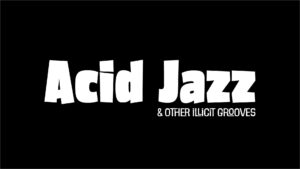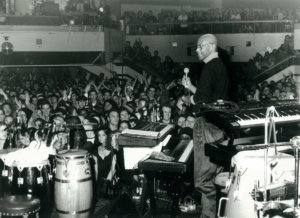We talk to the multi-faceted Eddie Piller about music and his part in urban gentrification.
Eddie Piller has been a mod, DJ, record label owner, club promoter and writer. His label Acid Jazz has been going for 35 years and forms part of a touring exhibition Acid Jazz & Other Illicit Grooves that starts at Centrala in Digbeth from 22nd-26th March. He paused for a few minutes to tell us about it.
“It’s the culmination of 35, 36 years hard work. The exhibition is being done by a co-operative of people who ran the Jazz Cafe and a few other like-minded places and I’m pleased to be a part of it. It goes back over the start of the label and the acid jazz scene which began in ’87-88. It was very big and it’s looking back on something that’s been forgotten, really.”
Who else is involved?
“Joe Pidgeon, who ran a magazine called Touch, then Paul Bradshaw, who ran the magazine Straight No Chaser. Acid Jazz Records, Talking Loud, Waitress, which is another record label. All the other labels stopped years ago, we’re the only one that’s still going so it’s nice to be back at the beginning.”
What else have you been doing?
“I’ve got a book coming out called Clean Living Under Difficult Circumstances which would tell you. I’ve got a radio station, Totally Wired, that we started four years ago and it’s just grown. We’ve just got a sponsor, it’s got a lot of listeners and it’s very professional.”
You started out as a mod back in the days of youth cult central, where being in the wrong place with your hair an inch too long could almost get you killed.

“I’m glad you mentioned this because the one thing my publishers did was to take the fighting out, and you write a book about the late seventies, the late seventies, getting attacked by skinheads and all that sort of thig, they’ve pretty much taken it out. I was quite disappointed by that, but it reads pretty well and if you were there you’ll get the book.
“The interesting thing about skinheads is that they were racist, let’s be honest. Up there in Birmingham and Coventry the ska scene was always being attacked by skinheads and yet I’ve never met one who ever admits to being racist. There’s a thing in the book about Sham’s Last Stand with 400 skins stripped to the waist and chanting. Then I was a roadie for the Angelic Upstarts and that was bad as well. Mensi, their singer, would jump off into the crowd and confront the racism and we had to drag him back. It only lasted a couple of years, thank God.”
The other strange thing from those days that you mention in the book is that bands like the Jam, the Buzzcocks, the Undertones and Nine Below Zero, they were all playing the same type of music and yet they had different labels attached to them and had different audiences. All these scenes were springing up but for a lot of people it was only when they got on Top of the Pops that you knew they existed.
“It was slightly different for me because we were down in London and going to gigs three or four times a week even when I was fourteen. We caught art punk with the Gang of Four and the Mekons, the mod revival and punk in general, and American art rock with bands like Television. But I’m going off topic now.”
Not that that’s ever a problem, but we do have an interview to do. Was acid jazz a direct evolution from mod or were you the exception?
“That’s a good question. I think the mod scene in London was pretty much hanging on by a thread by about 1985-86. A few of us moved over to jazz and the new generation of mods that came along joined us while the older ones didn’t. It got a bit fraught, with people arguing about acid jazz, but I don’t give a toss.”
You started the Blue Note club in Hoxton, which has been called the start of the area becoming fashionable.
“It’s true. It was the only thing in Hoxton. There was a newsagent and a late night typical East End cafe which was only like a green hut and that was it The whole of Shoreditch and Hoxton was bombsites. There was a late-night community there, and they were there because it was so cheap. There’d been a jazz club there previously that had fallen on hard times and we bought it off the receiver for not very much money but, and it’s a big but, the council didn’t like what we were doing so instead of backing us we had a five year legal fight to save the club and we lost. It’s like the Hacienda, everyone talks about how they love it, well they didn’t at the tome. I hate councils.”

So it’s your fault that the whole East End became gentrified?
“Unfortunately it was. It’s a real disaster now. You go to Shoreditch late at night now and it’s like Sodom and Gomorrah.”
The whole thing, and the London property boom and the whole associated cost of living problem. It’s all your fault.
“We had a bit of something to do with it, but in that area it would have happened anyway. But here’s the thing, I went to Soho last week and tourists think it’s great but it isn’t. It’s everything you don’t want. It’s brands, it’s got no soul, there’s no creativity.”
You’ve done loads of things but DJing for Pele, that must have stood out.
“I did that for him about fifteen years ago. He spoke very little English and there were loads of footballers there. Pele was standing by the decks all night, which was pretty cool. But I have to say, I did a lot of birthday parties. Paul Weller’s fiftieth, Paul McCartney, Sylvester Stallone was a classic. I’m not DJing much now but I should be back to normal soon.”
We’re obviously under difficult circumstances. Are you still living clean?
“I like to try. I’ve been fascinated by Peter Meaden (manager of the Who and originator of the quote) my whole life so there was only one title for the book because everything about him is just incredible. He was the ultimate mod. We were writing a book about him and we got death threats for writing about about him but that’s another story. I’d love to know why, but they were typed out and delivered to the office. We’d done about 25 interviews for the book but the publisher said we couldn’t carry on.”
The exhibition Acid Jazz & Other Illicit Grooves runs at Centrala from 22nd-26th March. Tickets.
Clean Living Under Difficult Circumstances: A Life In Mod is out on 6th April.


